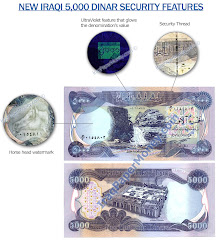Iraqi dinar recovering and it is the base in business dealings
04 February 2008
Heads of Iraqi unions of Chambers of Commerce confirmed that 2008 will be a year of quality transition in economic performance and the Government is expected to initiate the implementation of important projects, although that is linked to the adoption of the budget, which is still under parliament examination, scrutiny and amendment for approval.
On the sidelines of the sixth meeting of the Union within its to twelfth session which was held in Baghdad, here are some interviews with a number of heads of unions representing the traders segment.
Head of the Iraqi Federation of Chambers of Commerce, Jaafar Al-Hamadani, is optimistic for achieving a qualitative development in the area of trade relations with the world and for the improvement of security; however, he blamed on some differences in the formation and delay of activating the role of the National Authority for Investment to benefit from the advantages of the new investment law, but he expressed confidence in the promising future of the private sector, especially after the government decided to support it। He pointed out that supporting private banks will facilitate the work of traders, and the partnership launched by the ministries of industry, minerals and oil with international companies will be reflected on private activity in Iraq. He called for speeding up the establishment of the intellectual property rights law to be presented to the Cabinet and then to the Parliament and considered it an important means in the organization of economic life in the country.
Head of Baghdad Chamber of Commerce, Amjad Al-Jibouri, considered the monetary policy followed by the Central Bank to control the exchange rate of the dinar against the dollar a successful policy because it maintained trade from the losses which traders are exposed to due to monetary shocks. He said that The Central Bank and the Ministry of Finance succeeded in supporting the national economy in their monetary and fiscal policy, and raising the value of the Iraqi dinar is one of the results of these policies.
Al-Jibouri called for adopting an import policy that limits the chaos afflicting the commercial market and represented by dumping it with commodity and especially of the bad type, and believes that this is the responsibility of the Ministries of Finance and Trade relying on the representatives of chambers of commerce। About his vision for the future of the Iraqi economy, he said, "the economy is the engine of social and political life and if stability is achieved, the future of the Iraqi economy will be in the ranks of developed countries ... And will leave developing countries."
Head of Najaf Chamber of Commerce, Zuhair Mohammed Radhi, is optimistic of the economic future of Iraq due to the ingredients of success it has both in human and material wealth or its strategic position and border outlets which overlooks the world. He called for the creation of a new structure that suits the potentials of Iraq to start toward the economy of market and reiterated the importance of the supporting laws and legislation.
The last speaker was the Head of Nasiriyah Chamber of Commerce, Abdul Razzaq Al-Zuheiri,, who spoke about the lack of clarity and knowledge of the importance of the role of the private business sector in the formulation of trade policy, pointing out that the merchants segment is the one relied on to provide requirements of daily life and construction requirements. He trusted the government to support the commercial sector in a way that suits the size and role in the development of other economic sectors. He pointed out to understanding of government departments for the importance of Chambers of Commerce; therefore, involving them in all committees is hallmark of the success of proper planning for the economic process and development of the country.





